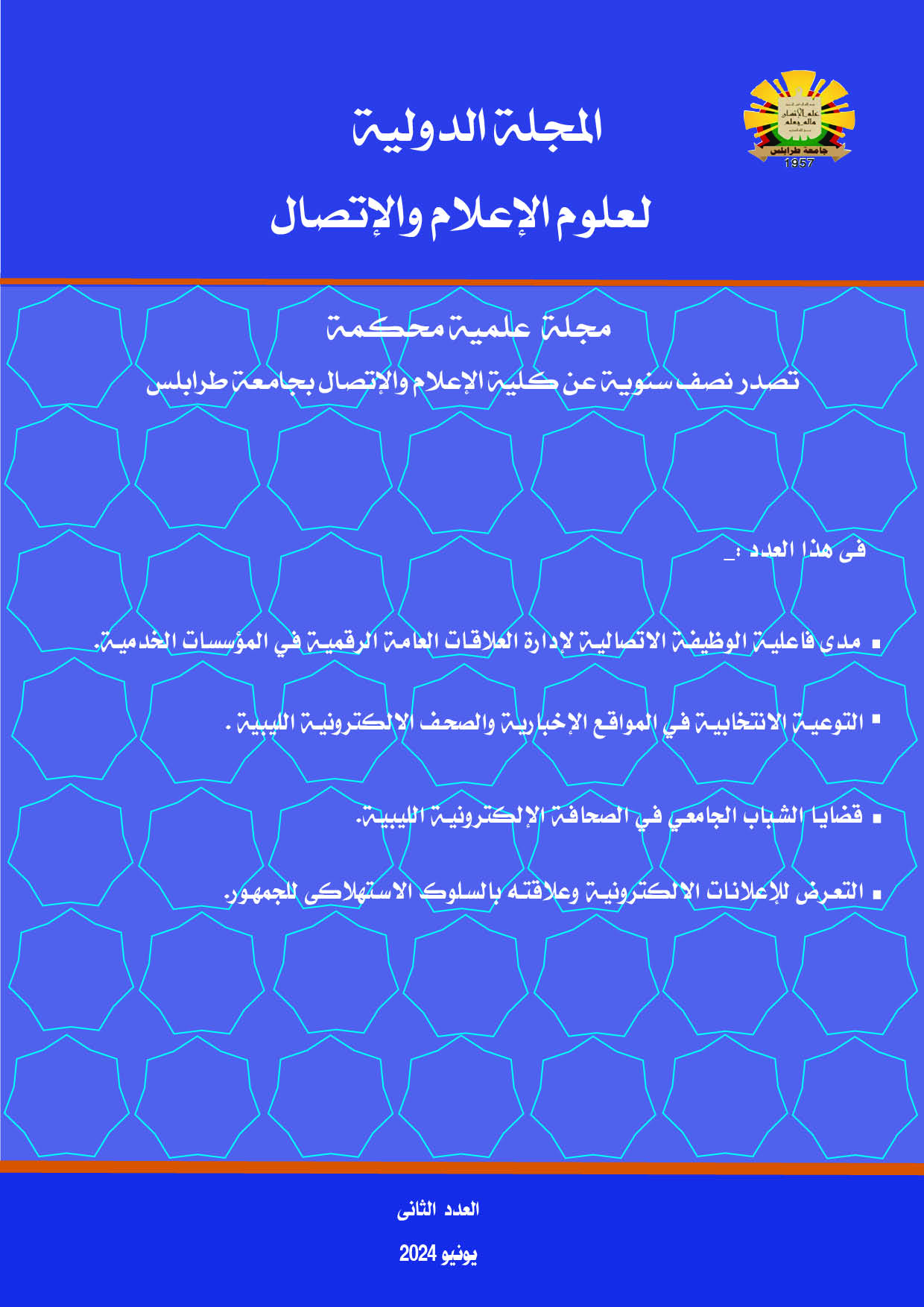السياسة التحريرية لوكالة الأنباء الليبية
الملخص
مُلخص البحث:
ينطلق هذا البحث من مشكلة تحددت في السياسة التحريرية المتبعة بوكالة الأنباء الليبية، في ظل حالة عدم الاستقرار السياسي والمؤسساتي في ليبيا، والذي انعكس على الوكالة سواء على مستوى أدائها الإخباري، أو تبعيتها الإدارية الرسمية التي أثارت الكثير من الجدل. يهدف هذا البحث إلى معرفة السياسات والموضوعات التي يركز عليها القائم بالاتصال في الوكالة أثناء انتقائه وصياغته للأخبار، وتحديد القيم الإخبارية الأكثر اعتمادًا وطريقة توظيفها، إضافة إلى الوقوف على الأسباب التي حالت دون وضوح جزء من هذه السياسات وقت الأزمات، وأثر عامل خبرة الصحفيين وحرّاس البوابة عمومًا، على تسيير العمل، استخدم الباحث المنهجين الوصفي والمسحي، من خلال عينة البحث التي مثلت 23 محررًا صحفيًا، أجابوا على تساؤلات استمارة الاستبيان التي جاءت في 16 سؤالاً، وتوصل الباحث إلى جملة من النتائج وهي: تُمثّل مصداقية الخبر ودقته، إضافة استشارة زملاء المهنة في الأخبار الحساسة، أهم السياسات الإعلامية التي يركز عليها القائم بالاتصال في الوكالة. يولي القائم بالاتصال في الوكالة أهمية كبرى لمسألة تقدير مسئول التحرير لطبيعة الظرف، وأخبار الدعم الدولي لليبيا، كأهم الموضوعات التي تمثل إطاراً عامًا تنتقى من خلاله الأخبار، فيما يغيب اهتمامه عن موضوعات: الانقسام السياسي، والحقوق والحريات، ودعم قيم المواطنة. يُهمل القائم بالاتصال في الوكالة قيم الغرابة والإثارة، ويرتكز جل اهتمامهم على قيم: أهمية الخبر، والسبق الصحفي. لا تكتب الملاحظات والسياسات التحريرية على لوحة صالة التحرير، وإنما تكون معروفة ضمنًا، ويلعب عامل الخبرة دور كبير في تسيير دفة العمل وقت تداخل الأحداث والأزمات. أهم الأسباب التي أدت لعدم وضوح السياسة التحريرية في الكثير من الأحيان تعود: لضبابية المشهد المحلي، وعدم وضوح السياسة العامة للدولة بالأساس، إضافة إلى قلة تواصل الحكومة مع الوكالة وإهمالها لصالح مؤسسات خاصة. هناك تناقض واضح في إجابات الصحفيين، فهم يؤكدون من جانب على أن حارس البوابة يلعب دوره في التعديل والإلغاء والإضافة، ثم يدحضون ذلك عندما يشيرون إلى إن دوره محدود في ظل حالة التخبط السياسي والإعلامي في الدولة!
Abstrat:
This research started from a problem identified in the editorial policy followed by the Libyan News Agency, in light of the state of political and institutional instability in Libya, which was reflected in the agency, whether at the level of its news performance, or its official administrative affiliation, which sparked a lot of controversy. This research aims to know the policies and topics that the agency’s communicator focuses on while selecting and formulating news, and to identify the most widely adopted news values and the method of employing them, in addition to identifying the reasons that prevented the clarity of some of these policies, and the impact of the experience factor of journalists and gatekeepers in general, on Conducting work in times of crises, the researcher used descriptive and survey approaches, through the research sample that represented 23 newspaper editors, who answered the questions of the questionnaire, which came in 16 questions, and the researcher reached a number of results, which are: representing the credibility and accuracy of the news, in addition to consulting colleagues in the profession in Sensitive news, the most important media policies that the agency’s communicator focuses on in terms of topics from which news can be derived. The agency's contact person attaches great importance to the issue of the editorial officer's assessment of the nature of the situation, and news of international support for Libya, as the most important topics that represent a general framework through which news is selected, while his interest is absent from the topics: political division, rights and freedoms, supporting the values of citizenship and strengthening social cohesion. The agency's communicator neglects the values of strangeness and excitement, and most of their attention is focused on the values: the importance of the news, and the scoop. Editorial notes and policies are not written on the editorial board, but are known implicitly, and the experience factor plays a major role in directing the work at times of overlapping events and crises. The most important reasons that led to the lack of clarity in editorial policy in many cases are: the blurring of the local scene, the lack of clarity in the general policy of the state in the first place, in addition to the government’s lack of communication with the agency and its neglect in favor of private institutions. There is a clear contradiction in the journalists’ answers. On the one hand, they emphasize that the gatekeeper plays his role in amending, canceling, and adding, and then they refute this when they point out that his role is limited in light of the state of political and media confusion in the country!

